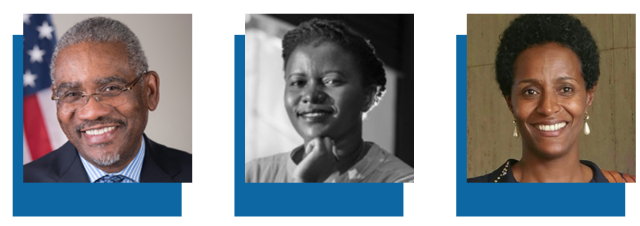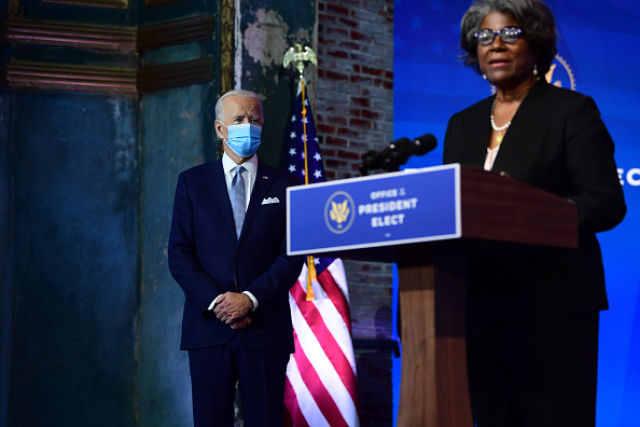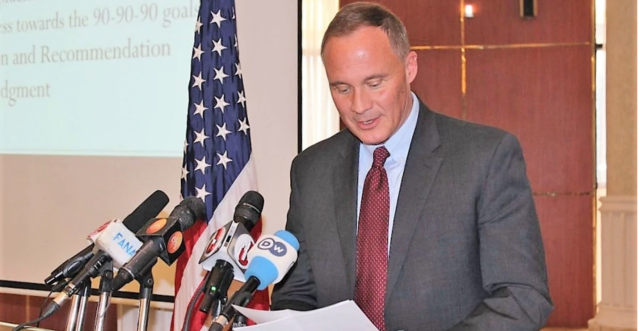 The online event, which took place today (Monday, Feb. 1st, 2021) was hosted by the Center for Strategic and International Studies (CSIS), featuring New York Congressman Gregory W. Meeks, the newly elected Chairman of the powerful U.S. House Foreign Affairs Committee, as well as Ethiopian Journalist and independent media advocate Tsedale Lemma, Founder and Editor of Addis Standard, and Rosebell Kagumire, a Ugandan multimedia and communications specialist, blogger, journalist and activist. (Photos via CSIS)
The online event, which took place today (Monday, Feb. 1st, 2021) was hosted by the Center for Strategic and International Studies (CSIS), featuring New York Congressman Gregory W. Meeks, the newly elected Chairman of the powerful U.S. House Foreign Affairs Committee, as well as Ethiopian Journalist and independent media advocate Tsedale Lemma, Founder and Editor of Addis Standard, and Rosebell Kagumire, a Ugandan multimedia and communications specialist, blogger, journalist and activist. (Photos via CSIS)
Tadias Magazine
By Tadias Staff
February 1st, 2021
New York (TADIAS) — This morning a timely conversation on new U.S. policy toward Africa including a discussion about Ethiopia was held in Washington, D.C.
The online event, which was hosted by the Center for Strategic and International Studies (CSIS), featured New York Congressman Gregory W. Meeks, the newly elected Chairman of the powerful U.S. House Foreign Affairs Committee, and the first Black Member of Congress to serve as Chair of that committee, as well as Ethiopian Journalist and independent media advocate Tsedale Lemma, Founder and Editor of Addis Standard, and Rosebell Kagumire, a Ugandan multimedia and communications specialist, blogger, journalist and activist.
According to the announcement Representative Meeks outlined “his vision for a reimagined approach to U.S.-Africa policy in a democratically controlled house and senate.” And for their part Tsedale and Rosebell in conversation with Rep. Meeks focused on current affairs in their respective countries and “and the impact of the Capitol attack on the U.S. government’s credibility,” concluding “with key recommendations for the new Biden Administration.”
Watch: Online Event — A New U.S. Policy Toward Africa — A Conversation with Chairman Gregory Meeks and Africa (CSIS)
—
Related:
Video: President Biden’s Designate Ambassador to UN Linda Thomas-Greenfield on Ethiopia

Among the questions that Ambassador Thomas-Greenfield — a veteran American diplomat who was the head of the State Department’s Bureau of African Affairs until 2017 — was asked about during her confirmation hearing on Wednesday included her take on the current situation in Ethiopia. (Getty Images)
Tadias Magazine
By Tadias Staff
Updated: January 27th, 2021
New York (TADIAS) — President Joe Biden’s nominee for US ambassador to the United Nations Linda Thomas-Greenfield fielded lawmakers’ questions during her confirmation hearing on Wednesday in Washington, D.C.
Among the questions that Ambassador Thomas-Greenfield — a veteran American diplomat who was the head of the State Department’s Bureau of African Affairs until 2017 — was asked about during her confirmation hearing included her take on the current situation in Ethiopia.
Below is video of her answer regarding Ethiopia:
—
Related:
Outgoing U.S. Ambassador to Ethiopia Michael Raynor Holds Final News Briefing

Ambassador Michael Raynor. (VOA)
Voice of America
By Eskinder Firew
Departing US Envoy Warns Ethiopia Against Violence
ADDIS ABABA – Calling Ethiopia “the critical actor in Horn of Africa stability,” outgoing U.S. Ambassador to Ethiopia Michael Raynor voiced confidence in a strengthened bilateral relationship but warned that violence – especially in the northern Tigray region – threatens the country’s progress.
“We remain concerned about ethnic violence around the country and the threat it poses to achieving the country’s potential,” Raynor said of Ethiopia, speaking at a press conference Monday in Addis Ababa, the capital.
It was Raynor’s final news briefing as ambassador, a post he has held since September 2017. He has focused on Africa for many of his 30-plus years as a diplomat.
Rivalries among some of Ethiopia’s 80 ethnic groups have spawned deadly violence, including the Jan. 12 killings of more than 80 civilians in Metekel, a town in the western Benishangul-Gumaz region, the Associated Press reported, citing information from the Ethiopian Human Rights Commission.
Raynor said the U.S. government also is “particularly alarmed by the ongoing situation in Tigray,” where Ethiopian federal forces launched a military operation in early November to put down a rebellion by regional forces of the Tigray People’s Liberation Front. Ethiopia’s government said that it had regained control of the region by late November, but reports of extrajudicial killings and other sporadic violence have continued to filter out.
Since the conflict’s outbreak, more than 58,000 have fled northern Ethiopia for neighboring Tigray, the International Organization for Migration reported Monday. While thousands are believed to have been killed and many more internally displaced, numbers are difficult to verify because of limited communications with, and access to, Tigray. The United Nations estimates that roughly 4.5 million people in Tigray desperately need food, medicine and other basics, and U.N. agencies have criticized Ethiopian authorities for blocking humanitarian aid.
“After almost three months, we’re still not seeing enough humanitarian assistance reach the most vulnerable areas,” Raynor told journalists. “Much more needs to be done, and urgently, to ensure humanitarian organizations – both Ethiopian and international – have full and secure access to the region to provide lifesaving support to the millions of people who are suffering.”
The U.N’s special representative on sexual violence, Pramila Patten, last week released a statement that she was “greatly concerned by serious allegations of sexual violence” in the region.
Raynor acknowledged that concern, saying the U.S. government continues “to call on all parties to cease any hostilities, ensure the protection of all civilians in Tigray, including refugees and humanitarian workers, and to uphold international human rights and humanitarian law.”
He also brought up the U.S. assessment that soldiers from Eritrea were helping Ethiopian federal forces in Tigray, despite Ethiopian authorities’ denials.
“We continue to be troubled by the activities of Eritrean actors in the Tigray region,” Raynor said, “and we continue to call for an immediate halt to — and independent investigations of — all credible reports of atrocities. sexual violence, human rights violations of all kinds in Tigray and other places.”
Improved bilateral relations
Raynor said that when Abiy Ahmed became prime minister in April 2018, replacing Hailemariam Desalegn after 23 years and introducing an array of reforms, “there was a fundamental reset, a realignment of core values fully in sync with U.S. core values, both in terms of economic opportunity and job creation and in terms of political space and respect for rights. So that formed a strong basis for us to expand our engagement.”
During his tenure as ambassador, Raynor said, the U.S. government “brought well over $3 billion” to support Ethiopia’s governance, development and humanitarian priorities. These range from enhancing the country’s food security and health systems to reforming judicial activities and updating economic policies to encourage private investment.
Raynor also observed that Ethiopia’s ability “to focus on our areas of partnership has been strained by some degree due to the rate of ethnic tensions and Ethiopian-on-Ethiopian violence and certainly the current Tigray crisis. But by and large I feel very optimistic about the trajectory we have been on and that my successor will be able to build upon.”
A successor has not yet been named.
“This is a pivotal time for Ethiopia,” Raynor said. “What Ethiopia does in the coming months — particularly in promoting democracy, organizing free and fair credible elections this year, protecting basic human rights including freedom of the press and freedom of expression, resolving conflict and addressing ethnic tension, maintaining regional harmony and promoting economic opportunity — will impact this country’s prospects for generations to come.”
—
Join the conversation on Twitter and Facebook.

























